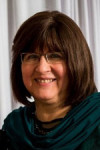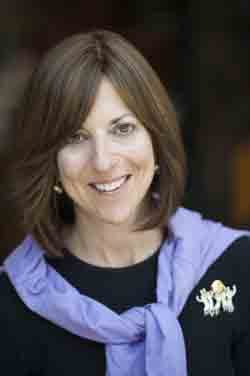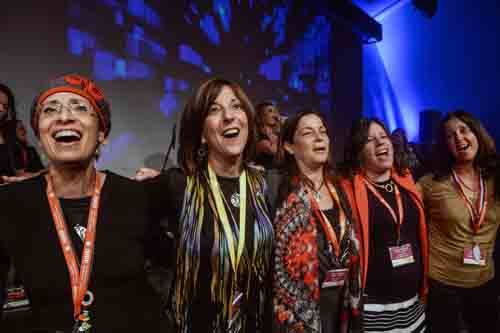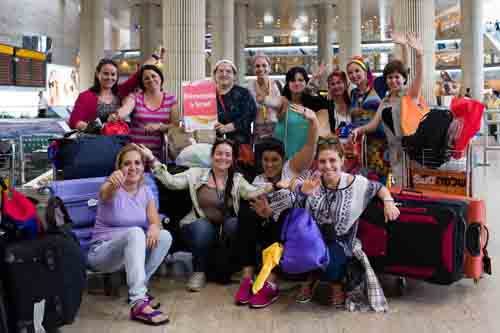By Toby Klein Greenwald


JERUSALEM — I’ve been following Lori Palatnik for years, on Aish.com and through the Jewish Women’s Renaissance Project (JWRP). I was curious about this fireball “out-reacher,” so when I saw they were holding another Israel trip in May, I made an appointment to interview her to find out where she came from and how it all began.
Palatnik grew up in a secular family of four kids, of which she was the third. She says, “My younger sister started getting into Judaism and we thought it was a cult, then a phase.” Lori was studying communications, working in advertising, working for Radio Canada, and won a national award for a Christmas commercial. (“Jews are good about Christmas.”) About to make a career move, she thought, “First I’ll go and see the world. My mother is an artist and I was raised with a lot of art and culture, so I got a backpack, thinking, ‘I have my experience, my award, I’m not married,’ and I went off. It was the 80’s. My friends were not going backpacking; they were getting their MBA’s.
“I had no plans to go to Israel. I wasn’t raised anti-Zionist, I wasn’t raised with anything. I didn’t know the words to ‘Hatikva,’ didn’t have Jewish friends. It was strange circumstances that led me to Israel.”
Palatnik’s mother was planning a surprise party for her father’s 50th birthday. ”It was a cruise down the Nile.” Her mother offered Lori a ticket also, since she’d be in Europe anyway, so why not join them in Egypt?
She was in Greece, getting a ticket to Cairo, when the airline people told her, “We’ve been looking for you! Your family’s trying to reach you!”
“They told me that my grandfather had died and my parents had to turn back from Amsterdam, but they had left a message that I should go on to Israel. Part of the cruise was a stop in Haifa; it was going to be 24 hours in Israel. Later I asked my mom, ’Why Israel?’ And she said, ‘I just didn’t want you to miss out on that.’” In retrospect, Palatnik says, “My grandfather had been the most traditional in the family, and I felt that he was pulling strings in heaven.”
She got on the plane, crying, and then thought, “Wait a minute, I’m going to Israel. I was very confused about my Judaism because somewhere between my sister who was off the charts, my parents, who didn’t keep anything, and their parents who had come from Europe… I was somewhere in between. I was in my early 20’s, and thought, ‘Does it matter if I marry someone Jewish?’ And I thought, ‘If I’m ever going to have clarity, this is it! I’m going to land here and be Jewish and have clarity.’
“And I stood on the tarmac and waited to feel Jewish. And I didn’t feel anything.”
She got through passport control and was met by a friend, Debby, who had married a Zionist in Toronto. They lived in Beer Sheva, and Debby said, “Use our home and go see the country.”
Lori pauses. “I’m backpacking around Israel and everywhere I go I’m looking to feel Jewish, trying to get clarity, and thinking, ‘Why don’t I just enjoy this country like every other country? I’ve been through Italy and Holland and Switzerland, seen beautiful places, so a bunch of Jews are here. I’ll enjoy the arts, food, wine, culture…’ So of course when I stopped trying to feel something, I started to feel something, and I really didn’t know what I was feeling, but I thought, ‘If I don’t leave now, I’ll live here forever,’ so I left.”
She, returned to her life, started writing about Canadian women living abroad, moved to Ottawa, and got a job for public relations with McDonald’s restaurants.
“One year later a package arrived in the mail inviting me to apply to the Jerusalem Fellowships. Apparently someone put me on a list – you know how you meet a lot of people when you’re traveling — and I got this application and when I opened it up I knew that the feeling was probably there all along, that even though I’d been through the most beautiful countries, I couldn’t get Israel out of my heart and every time I opened up a newspaper or TV or radio, it was there.
”It was 1985. I had a new job and a social life, but my sister encouraged me to apply. I was accepted to the program, my new employer said they’d hold my job and even asked if I needed an advance. Clearly there was more of a plan.”
For six weeks she joined 120 other singles who studied, toured, met with politicians and visited the president’s house. “About four weeks into the six week program, those feelings came back — that I want to live here forever. I didn’t know why, but I knew it had something to do with God, with the destiny of the Jewish people and with the responsibility of the Jewish people in the world, even though I still had questions, like about the role of women, and more.
“I knew we had to be a light to the nations, and I knew I was a very dim light, and how could I be a light if I didn’t know anything? I didn’t have a bat mitzvah but we were Jewish and my parents did their best, and suddenly all this was flying around and I said, ‘If I don’t get answers, I’ll just go back to my life,’ because I wanted to make educated decisions.
“But I knew my Jewish education was pretty weak. So I stayed for one more Shabbat, and one more Shabbat, and one more Shabbat… and then I made a lot of heavy phone calls and said, ‘I’m not coming back.’
“I gave up my job. I didn’t know how long I’d be in Israel, but I started an aerobics business.” A professor at a school at which she was studying wanted a trainer, so she began with a small group of girls and continued to train others while she studied Judaism. “Until then, I had thought my sister and her friends were what it meant to be a religious Jew, and then I met women who are doctors and lawyers, etc. and I had to get my questions answered and trying to find my place.”
She adds, thoughtfully, “I’m still trying to find my place.”
From Jerusalem to Toronto, Denver, D.C.
Palatnik stayed in Israel for a year, returned to Toronto, and someone introduced her to her husband. “We got married and went back to Israel, forever. But then he got a good job offer, so we returned to Toronto, for a three year commitment, which lasted 13 years.
“We opened an outreach synagogue, called the Village Shul. First it was in the basement of a shul, then in my living room, then in a storefront, and we couldn’t afford a sign but it used to be a cheese store, called ’An Adventure in Cheese‘ so they called us ’Jews for Cheeses.’ My husband raised a few million dollars, put up a building.
“We were involved with people who knew we were doing something unique, had the ability to financially back this, so we bought a gas station, tore it down, and built a 24,000 sq. ft. center. We affected hundreds of families. Then my husband said, ‘Let’s give it to another rabbi, and go to another city.’ We left in 2000.”
Like the command given to Avraham — “West, East, North, South” — the family moved around. – All five of their children were born in Canada. Then they went to Denver for four years, and have been in Washington, D.C. for the last ten. “I was writing books, was invited to be a speaker (there were not a lot of women speaking), but mostly was a ‘stay at home mom‘ for thirteen years… speaking and writing books and building communities – from the home.”
Two years after moving to D.C. Palatnik thought, “I knew through my international speaking that communities are getting weaker and organizations are not working together, they’re too busy looking at the competition, so I gathered seven women from D.C. and we went to Utah (one of the women owned a place there) and we spent three and a half days there. I consulted with a business woman, and asked, “How do you take a disparate group of people and create an organization? I want to start a women’s organization.” I went through the steps with those seven truly diverse women and the JWRP was born. Half of them were shomer Shabbat, half were not. Half were Democrats, half were politically conservative. One was single, one was married with no kids, others had grown kids…I wanted everyone’s voice.”
The idea that crystalized was “an inspiring trip to Israel for Jewish mothers. In the 30 years I’ve been working on outreach, I have never seen something that captured everyone’s imagination like this did, because a community lives and dies by where the women are at.
“I’ve spoken on all the campuses, and I believe in all the youth programs, but more and more I came to see that if you inspire a 21-year-old boy, you inspire the boy, but if you inspire the mother, you inspire the whole family.”
Palatnik says, “The mothers decide the important things, like where we live, where the kids will go to school…these are decisions that will affect your families for generations, will affect who your grandchildren will be, so I say to them, ‘Choose wisely.’ It is faster to do it through the mother. She’s the most important and the most under-served. She’s the pivot. Our data shows it’s clear. After the first year, we showed them where our alumni are, that this is a game changer.
“We do everything in partnership. One of our founding values is: If we work together, we can do so much more. Unfortunately organizations see others as competition, instead of as partners in kiddush Hashem. We created an umbrella organization so they can work together. The golden rule is: Whoever holds the gold, rules, so they work together because we tell them, ‘If you don’t work together, we can’t fund you…there are no exclusives on the Jewish people.’ We pay 85% of the funding; the trip costs about $3000 per woman. They discover it’s a win-win.
“In the year-long experience, with the trip being the central core, the women attend classes in their local community to further their journey. Partnering organizations provide various aspects. Torah study can be accessed through the local outreach kollel, Israel advocacy through the Federation, and more. We’re one people with one heart. Receiving the Torah together was the first and last time it ever happened,
“The only time we come together is when we’re threatened from the outside. I’m not waiting for another disaster. Let’s come together for the things we can share; we become vulnerable when we are divisive.” She compares it to a family. “My kids are each very different, they love each other, my husband and I want to give them the world, and when they don’t get along, we think, this is not why we had you.”
The Program
The Israel trip is adventurous and inspiring, stretching from the north to the south, covering places and moments of spirituality, modernity and events unique to the Israel experience.
Palatnik says, “In Sfat we give them a class on marriage and then bring them to see a stunning mikvah. In Tel Aviv they visit a theatre for the deaf and blind, and also Independence Hall where they relive the moment the State of Israel was declared. After Yad Vashem, we tell them that to counter evil, we must put good into the world, so we take them to various chessed [charity] organizations and they volunteer at Shalva and Yad L’Kashish. At an IDF base they bring gifts and letters to the soldiers from their children. On Masada we have a ’Lady Naming,’ where women who never received Jewish names have a ceremony in the 2,000 year old synagogue and become Leah, Tova and Sarah. The JWRP women sing and dance for them as they change their name tags and feel even closer to their place within the Jewish people.”
In 2009, the first year, there were 300 women, from Canada, U.S, and Mexico. “It was fantastic. The next year there were 600 women, then 900, then 1000…Two years ago the Israeli government’s Ministry of Diaspora Affairs came to us and invited us to talk to them because they heard about us. Minister of Diaspora Affairs, Naftali Bennett said to his staff, ’Go find out who is doing good work in the diaspora,’ and after a series of meetings, we created a partnership. They asked us to expand into Eastern Europe, so I’m traveling to Russia, Hungary, Germany…
“We doubled our numbers, and indeed got into Eastern Europe. The government assessed and just signed a contract that will contribute 5.1 million dollars toward a $20 million two year budget. We’ve brought over 7500 participants since 2009 and in the next two years we’ll bring 7000 more.”

This last May, more than 800 Jewish mothers from 10 countries around the world were present at a Mega Event at Bar Ilan University, in partnership with the Ministry of Diaspora Affairs, headlined by Minister of Diaspora Affairs Naftali Bennett. The mothers came from Australia, Argentina, Canada, Chile, Cuba, Germany, Mexico, Panama, South Africa and the U.S. Some Israelis also participated. The JWRP and Ministry of Diaspora Affairs recently announced an historic partnership to dramatically expand the JWRP’s trips for over 5,600 Jewish mothers from 26 countries around the world, including women from Jewish communities facing increased threats of anti-Semitism and economic hardship, especially in Argentina, Cuba, the former Soviet Union, France, the U.S., and Canada.
What about the men? “Since the first year, the women said, ’My husband wants to come.’ One guy wrote me from Atlanta, ’On behalf of all the men in Atlanta who don’t have the guts to contact you, help us because we’re behind our wives.’ My board was hesitant, but finally told me, ’If you can raise $50,000 dollars above the budget, we will let you try.’
“We brought two buses of men the first year and it was a tremendous success. The wives are pushing the husbands out the door to come. I convinced Charlie Harary to lead the men and it was fantastic. The men’s trips are not as subsidized as the women’s, but every seat on every bus is taken.
“100% of the women reported that it was easier to grow in their Judaism since their husbands returned from the trip. It is more powerful to take a woman out of her life. They say, ‘This is the first time, I can remember, that I wasn’t someone’s mother, wife, etc. I was just me.’ Women say, ‘You helped me find the best part of me.’ When was the last time someone took care of us?”
They sometimes run two trips concurrently, but “We come together for Shabbat.” At the Shabbat in May, they were 400 women from nine countries. They are always seeking new frontiers. In July, in addition to their regular trips, for the first time they brought women from abroad involved in the fashion industry.

Cuba
For the first time, women from Cuba joined the JWRP trip in May. Palatnik says, “Two years ago I went to the funeral of the father of a friend of mine, and, through the eulogies, heard the story of his life. His parents were from Eastern Europe, and ended up in Cuba while fleeing the Holocaust. He was born there, but got out of Cuba when the revolution was beginning. He made his fortune in the U.S. and tried to help as many people as possible. I was very moved and inspired and told my friend, ‘We’re bringing a group from there to Israel.’ With her support, we went to Cuba with our Latin American coordinator, not knowing what was going to happen.
“In Havana they brought me to a synagogue and I saw four yahrtzheit plaques displaying 200 names, including the parents of the man who had died, and I saw there were no bulbs, just empty sockets. When I asked why there were no bulbs, they said, ‘Even if we had the money, which we don’t, you can’t buy bulbs here.’ So I took a picture, ‘and I thought, I’m going to get bulbs. And then I thought, Lori, these people are up in heaven and they’re yelling down at me, ‘Forget the bulbs! You want to light up my memory? Do something with my children and grandchildren! Just bring the women from this community.’
Thankfully we had a sponsor to bring ten women. We even gave each Cuban woman spending money. I said, ‘You’ll be like everyone else.’ We wanted to do it with dignity. And I told the women from Panama and Mexico and the whole group, ‘Because of your great-grandparents, you ended up in Panama, your lives are different. But some ended up in Cuba and that could have been you, and we’re sisters. We’re Jewish women and Jewish sisters,’ and when we teach them these values, they’re blown away. We’re trying to create a movement and it’s starting to happen.
“I feel very small in the face of what the Almighty wants to happen. I feel very humbled and privileged. God sent me a team off the charts. We really mean it when we say ‘big tent.’ A lot of people say that, but everyone on their team kind of looks the same. We are an eclectic bunch, united behind the same Jewish values. And I think that unity has merited G-d’s blessing.
“We’re educating the mothers and encouraging them to get their kids involved and letting them know that their kids are in danger on campus. We work with ’Stand with Us.’ We bring them in to educate and empower our women. I have a daughter who made aliya, who is a film producer for Jerusalem U, and directed the anti-BDS film, Crossing the Line.” Their second child was a sharpshooter in the IDF, a lone soldier, and now he’s in New York, says Palatnik, working with OU Advocacy. “Our son Moshie is at Feivelson’s yeshiva in Jerusalem. He recently married Nili Couzens’ daughter, Esti. Nili is a good friend and one of our JWRP Trip Leaders. She moved her family here eight months ago. My son was not planning to live long term in Israel, but since his bride wants to, it looks like the plan has changed. That’s the power of the woman.
“Our other daughter studied for two years in Jerusalem; now she’s working for Project Inspire in New Jersey. Our youngest is on her way to Israel, so all roads lead to Israel.
“I’ve been praying over my candles for 30 years that we should have the merit to live here. But if my husband and I can’t live here now, we send our children ahead. One day it will be a one way ticket for us, please God. Meantime, I feel very privileged, to help these women come to Israel to connect and learn Jewish values. I just feel that we’re on to something very great. I don’t know where it’s going to lead, but right now the potential is beyond words.”
Her future dream is “to duplicate what we did outside of Israel, in Israel.” To this end, they grew from the engaging of 50 Israeli moms in 2014, to a projected 300 in 2017. “We have 3-5 Israeli women on every bus. They come on as ambassadors. Lots of times Americans come and the only Israeli they meet is the bus driver. When they meet Israelis like themselves, they are inspired.
“I’d like to create a movement of unity in Israel — I don’t think it’s going to happen through men, but through women, we’ll find our commonality.”
*
The 2015 JWRP Annual Report indicates that women came from three countries in 2009, and from 24 countries in 2015. 89% of the participants in the program remain involved with the organization that brought them on the trip, many of them in the areas of community, educational and leadership activities, and in Israel engagement. 99% say that being Jewish is more important to them than it was before, and their participation in support of the Jewish community, their own increased Jewish study, their connection to Israel, the decision to move their children to a Jewish school — all these activities and more are exponentially impacted.
*
The author is the award-winning artistic director of Raise Your Spirits Theatre (which includes women from diverse backgrounds) and the editor of WholeFamily.com. She lives in Efrat, Israel.